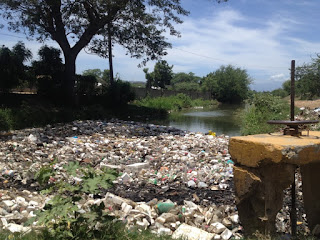3 Ways to Tackle Waste Management in Low-Resource Settings
 |
| Plastic bottles pile up near a water source in the DR. |
In the Dominican Republic, solid waste management is a huge challenge due to a lack of resources and limited space for inhabitants and landfills. Trash collection is virtually non-existent on the island and practices are unsafe for handlers where it does exist. Materials like plastic, pharmaceuticals, and fertilizers are often disposed of improperly, contaminating the water supply and posing a serious hazard to public health.
In January, Farmer-to-Farmer volunteer Annette Poliwka traveled to the DR as a solid waste management specialist to assess local challenges through meetings with schools, universities and community leaders. Here are some important take-aways from Annette’s recommendations to improve waste management practices in the Dominican Republic:
1) Invest in local communities
Annette found human behavior to be one of the biggest barriers to effective waste management. If community habits can change, then recycling and compost programs are far more likely to be effective. After meeting with local NGO Plan Yaque, Annette’s suggested creating a public media campaign on the benefits of composting, the water cycle, and climate change. Additionally, Annette proposed a community recycling center where residents can purchase recycled plastics, exchange old clothing, and dispose of toxic materials. This prevents the contamination of groundwater, increases citizen engagement, and improves public health!
2) Empower youth
During her time in the DR, Annette’s waste management project was met with enthusiasm by students at Jarabacoa Environmental School. They were excited by the recycling and composting plan she helped create and the wealth of resources she provided to reduce waste at the school. The youth were clearly invested in solving this problem and have excellent leadership skills for shaping community habits and behavior. Greater youth engagement means greater potential for future sustainable solutions!
3) Form Partnerships
Many of the major problems Annette observed in the DR are common in other settings where waste management resources are low. Puerto Rico, Mexico, and even the local resort have developed programs for sustainable materials management that can serve as models for new initiatives in schools and communities on the island. Worm composting, waste mapping, and public-private partnerships are all part ofsolutions that the DR can adopt by forming cohesive partnerships with existing organizations.
In January, Farmer-to-Farmer volunteer Annette Poliwka traveled to the DR as a solid waste management specialist to assess local challenges through meetings with schools, universities and community leaders. Here are some important take-aways from Annette’s recommendations to improve waste management practices in the Dominican Republic:
1) Invest in local communities
Annette found human behavior to be one of the biggest barriers to effective waste management. If community habits can change, then recycling and compost programs are far more likely to be effective. After meeting with local NGO Plan Yaque, Annette’s suggested creating a public media campaign on the benefits of composting, the water cycle, and climate change. Additionally, Annette proposed a community recycling center where residents can purchase recycled plastics, exchange old clothing, and dispose of toxic materials. This prevents the contamination of groundwater, increases citizen engagement, and improves public health!
2) Empower youth
During her time in the DR, Annette’s waste management project was met with enthusiasm by students at Jarabacoa Environmental School. They were excited by the recycling and composting plan she helped create and the wealth of resources she provided to reduce waste at the school. The youth were clearly invested in solving this problem and have excellent leadership skills for shaping community habits and behavior. Greater youth engagement means greater potential for future sustainable solutions!
3) Form Partnerships
 |
| Plastic used to protect banana crops from pests will be thrown into a landfill after use. |
Many of the major problems Annette observed in the DR are common in other settings where waste management resources are low. Puerto Rico, Mexico, and even the local resort have developed programs for sustainable materials management that can serve as models for new initiatives in schools and communities on the island. Worm composting, waste mapping, and public-private partnerships are all part ofsolutions that the DR can adopt by forming cohesive partnerships with existing organizations.
Browse around the rest of our blog to read more about the Jarabacoa Environmental School, climate change education, Plan Yaque, and water quality projects.

.png)

Comments
Post a Comment